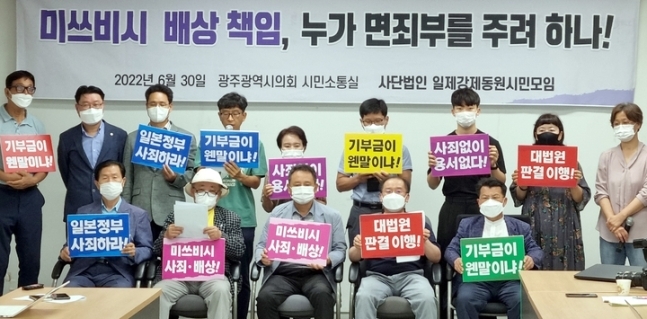South Korea plans to establish a public-private consultative group to discuss possible solutions in providing compensation for the victims of Japan’s coercion into labor during wartime, ratcheting up efforts to reset strained ties with Japan.
According to victim support organizations here, the Ministry of Foreign Affairs requested that victims attend the first meeting of the envisioned consultative group of civil organizations and the government, set to launch Monday.
The entity would be focused on Seoul’s top court’s ruling in 2018 to liquidate Korea-based assets of some Japanese companies as compensation for Koreans who were forced into labor during the Japanese occupation of the Korean Peninsula from 1910-45.
Japan has strongly protested the ruling and demanded that the South Korean government resolve the issue on its own, saying all arguments stemming from its annexation of the Korean Peninsula were settled through a 1965 agreement under which compensation was paid along with a low-interest loan being given to South Korea.
As the final ruling from the Supreme Court is expected in August or September, the Yoon Suk-yeol administration, inaugurated in May, is moving to address the issue as it seeks to revive soured relations with Japan.
As part of that effort, the Foreign Ministry has been pushing to create an entity where they would gather opinions from both civil organizations and government bodies on possible solutions to the wartime forced labor issue, as the date is approaching for the Japanese companies to sell off their assets in August.
Observers view that bilateral ties would be seriously damaged if the asset liquidation is carried out as the court has ordered.
“We are reviewing for ways to rationally resolve the issue while protecting the national interests of both countries,” the Foreign Ministry said.
Around a dozen people from the ministry, victim organizations and experts in international affairs and Japan are said to take part in the consultative group, but it is highly unlikely that the victims themselves would attend the meetings.
Possible solutions being raised include Seoul creating a fund to provide compensation for the victims, where the money would be raised from both South Korean and Japanese companies.
“It would be ideal for the Japanese companies and Korean companies that received financial benefits from the 1965 agreement to raise the funding to provide compensation to the victims,” said Jin Chang-soo, a Japan expert at the Sejong Institute think tank.
The Foreign Ministry maintains that nothing has been decided about forming such a consultative entity, and on potential solutions.
But a civic organization supporting the victims, which held a press conference Thursday denouncing the plan for a state-led fund, called it “a means to exonerate the Japanese perpetrators.”
“Instead of taking time to self-reflect (on its faults), the Japanese government is intervening in a lawsuit against private companies to plainly interfere (in executing the court order). It is also threatening the South Korean government to bring a solution,” the organization said.
“And the South Korean government is looking for solutions in the wrong place.”
Lim Jae-sung, an attorney representing the victims, said they would only be able to accept the result when the two companies involved in the case take part in the envisioned fund for compensation.
“At the least, Mitsubishi Heavy Industries and Nippon Steel Corp. should be participating in the fund. If they are not, we cannot but say that a third party is raising money to extinguish the liability (of the companies),” Lim said in a radio interview Thursday.
Lim also said it is necessary for the companies to admit fault and sincerely apologize to the victims.
“In addition, this case is not a simple civil action, but is in relation to the (country’s) historical disputes which will be recorded in history textbooks,” he said.
In settling the case, one of the solutions could be that the Korean government would give money to the victims first before asking the Japanese government for reimbursement.
Some of the sticking points include whether the Japanese government would be attentive to Korea’s proposal, and whether Japanese companies would participate in the fund for victims.
Many of the disputes standing between the countries come from their differing interpretations of the 1965 bilateral agreement.
At that time, Korea received $300 million from Japan to settle all claims related to Japan’s annexation of Korea. But the Korean court handed down a ruling in 2018 demanding Japanese companies also provide compensation, in the view that the annexation was illegal from the start.
By Jo He-rim (
herim@heraldcorp.com)







![[Today’s K-pop] Blackpink’s Jennie, Lisa invited to Coachella as solo acts](http://res.heraldm.com/phpwas/restmb_idxmake.php?idx=644&simg=/content/image/2024/11/21/20241121050099_0.jpg)
